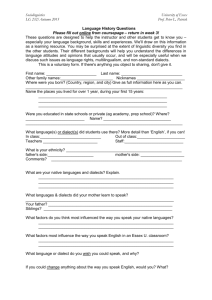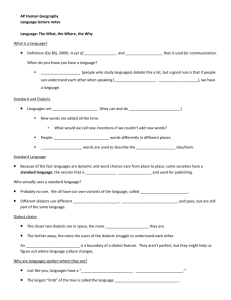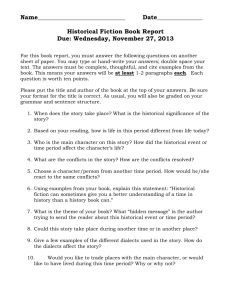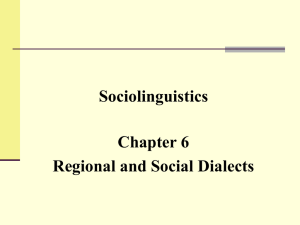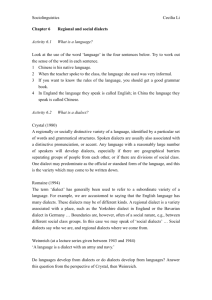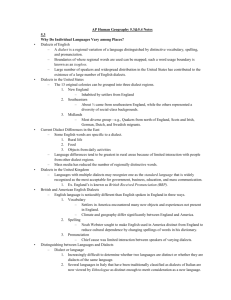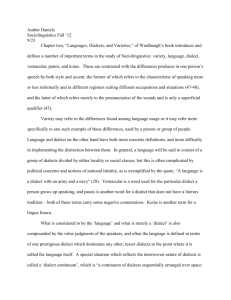The Grammar of English Dialects
advertisement
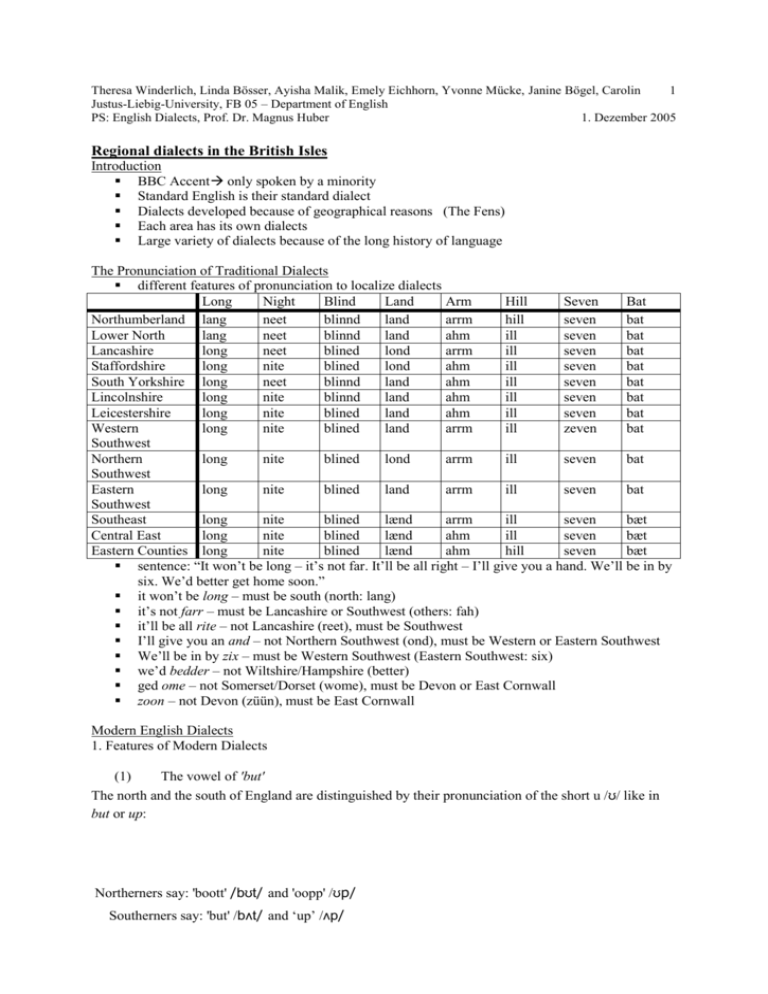
Theresa Winderlich, Linda Bösser, Ayisha Malik, Emely Eichhorn, Yvonne Mücke, Janine Bögel, Carolin 1 Justus-Liebig-University, FB 05 – Department of English PS: English Dialects, Prof. Dr. Magnus Huber 1. Dezember 2005 Regional dialects in the British Isles Introduction BBC Accent only spoken by a minority Standard English is their standard dialect Dialects developed because of geographical reasons (The Fens) Each area has its own dialects Large variety of dialects because of the long history of language The Pronunciation of Traditional Dialects different features of pronunciation to localize dialects Long Night Blind Land Arm Hill Seven Bat Northumberland lang neet blinnd land arrm hill seven bat Lower North lang neet blinnd land ahm ill seven bat Lancashire long neet blined lond arrm ill seven bat Staffordshire long nite blined lond ahm ill seven bat South Yorkshire long neet blinnd land ahm ill seven bat Lincolnshire long nite blinnd land ahm ill seven bat Leicestershire long nite blined land ahm ill seven bat Western long nite blined land arrm ill zeven bat Southwest Northern long nite blined lond arrm ill seven bat Southwest Eastern long nite blined land arrm ill seven bat Southwest Southeast long nite blined lænd arrm ill seven bæt Central East long nite blined lænd ahm ill seven bæt Eastern Counties long nite blined lænd ahm hill seven bæt sentence: “It won’t be long – it’s not far. It’ll be all right – I’ll give you a hand. We’ll be in by six. We’d better get home soon.” it won’t be long – must be south (north: lang) it’s not farr – must be Lancashire or Southwest (others: fah) it’ll be all rite – not Lancashire (reet), must be Southwest I’ll give you an and – not Northern Southwest (ond), must be Western or Eastern Southwest We’ll be in by zix – must be Western Southwest (Eastern Southwest: six) we’d bedder – not Wiltshire/Hampshire (better) ged ome – not Somerset/Dorset (wome), must be Devon or East Cornwall zoon – not Devon (züün), must be East Cornwall Modern English Dialects 1. Features of Modern Dialects (1) The vowel of 'but' The north and the south of England are distinguished by their pronunciation of the short u /ʊ/ like in but or up: Northerners say: 'boott' /bʊt/ and 'oopp' /ʊp/ Southerners say: 'but' /bʌt/ and ‘up’ /ʌp/ Northern accents have preserved the older medieval (Middle English) vowel system Southern accents have developed the additional short u vowel /ʌ/ 2. Pronunciation of R in 'arm' the change of ‘arrm’ /aːrm/ ‘ahm’ /aːm/ has started in the southeast of England (London, South Midlands and East Anglia) r-pronouncing accents today: only in parts of Lancashire (Blackburn & Burnley) & in southwest England (e.g.: Cornwall, Devon, Somerset…) every year the r-pronouncing area becomes smaller consequences of the loss of 'r' in modern dialects: a) linking 'r': The 'r' was dropped before a consonant or pause but retained before a vowel (/aː/ , /ɔː/, /ɪə/, /ə/). r pronounced: car engine; four o'clock; near it; better off r not pronounced: car port; four thirty; near them; better liked b) intrusive 'r': Words which did not have 'r' in their pronunciation but ended in one of these four vowels (/aː/, /ɔː/, /ɪə/, /ə/) came to be treated the same way: r pronounced: bra-r advert; saw-r it; idea-r of; Angela-r Evans r not pronounced: bra strap; saw them; idea for; Angela Smith (2) (3) (4) (5) (6) Pronunciation of ng in 'singer' Pronunciation of ew in 'few' Pronunciation of ee in 'coffee' Pronunciation of a in 'gate' Pronunciation of l in 'milk' 1. Sixteen Modern Dialect Regions of England Putting together all seven features named above and drawing a composite accent map of England, we finally come up with a differentiation of sixteen Modern Dialect regions of England: (1) Northeast (Newcastle, Durham, Sunderland) Bsp: Veree few cahs mehd it opp the long hill. /veriː fjuː kaːz meːd ɪt ʊp ðə lɒŋ hɪl/ (2) Home Counties (London, Brighton, Dover) Bsp: Veree few cahs mayd it up the long iooll. /veriː fjuː kaːz meɪd ɪt ʌp ðə lɒŋ ɪʊl/ Central North (Leeds, Bradford, York); Central Lancashire (Blackburn, Burnlay, Accrington); Humberside (Hull, Scunthorpe, Grimsby); Merseyside (Liverpool, Birkenhead); Northwest Midlands (Derby, Chester, Manchester);West Midlands (Birmingham, Walsall); Northeast Midlands (Lincoln, Louth); Central Midlands (Nottingham, Leicester); East Midlands (Grantham, Peterborough); Upper Southwest (Gloucester, Hereford);Central Southwest (Bristol, Salisbury); Lower Southwest (Plymouth, Exeter, Truro); South Midlands (Bedford, Northampton, Cambridge); East Anglia (Norwich, Ipswich) The Grammar of English Dialects 1. Grammatical Distinctions This/that demonstrative system of Standard English is a two-way system while Traditional Dialects have a three-way distinction Standard English differs from other dialects due to the lost of old forms development of new forms 2. Personal Pronouns Modern Dialects: use of me rather than my use of us as a singular Nonstandard Modern Dialects have developed a system of reflexive pronouns, which is different from that of Standard English (hisself, theirselves) Traditional Dialects: possessive forms end in –n (mine, hisn, ourn) Thou and thee were used for the singular, ye and you were used for the plural Pronoun Gender in the Southwest: he can be referred to count nouns, it can be referred to mass nouns Pronoun Exchange: he, she, we, they can occur as objects as well as subjects of verb 3. Verbs Standard English Nonstandard English Third person singular –s, all other persons without an –s ending - East Anglian area: no –s endings at all - western and northern dialects: all persons carry –s endings Negation: aren’t, isn’t or haven’t Example: You aren’t coming You haven’t done it Negation: Ain’t Example: You ain’t coming You ain’t done it (doesn’t apply to the full verb of have) Forms of be: highly irregular some dialects use was for all persons in the past tense, others rather were some dialects in the North have is for all persons in the present tense, while others in the Staffordshire are have am throughout 4. The Future it is very unlikely that the differences within Traditional Dialects and also within Modern Dialects will diminish to any great extent Dialect words 1. Regional vocabulary Regional vocabulary → traditional dialects 2. Dialects and Standard Words Non- Regional vocabulary: The traditional dialect word of one region became the Standard English word. 3. Vocabulary Origins Joseph Wright’s wrote the “English Dialect Dictionary” Reasons for different vocabulary: settlement patters and geographical patters 4. Vocabulary Loss Example: Traditional Dialect: girl, lass, mawther, maiden, wench Modern Dialect: girl, lass Standard Dialect: girl This loss of vocabulary is called: LEXICAL ATTRITION (It’s a eating away of dialects words) reasons: changes of social life Source: Trudgill, Peter. 19992. The dialects of England. Oxford: Blackwell.
